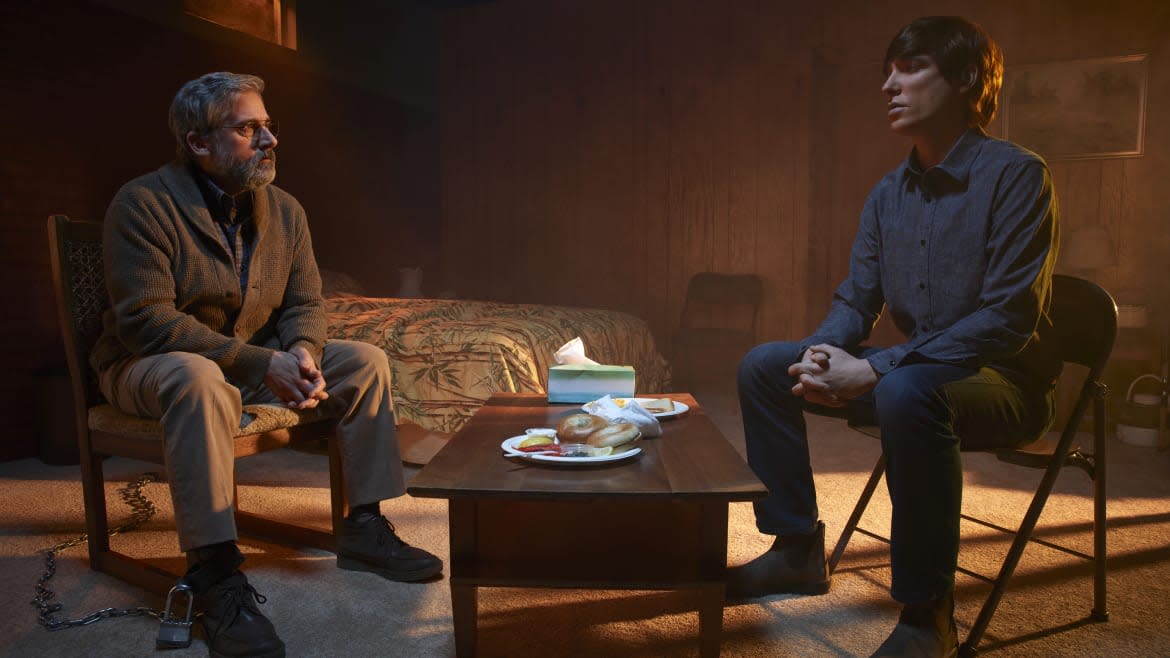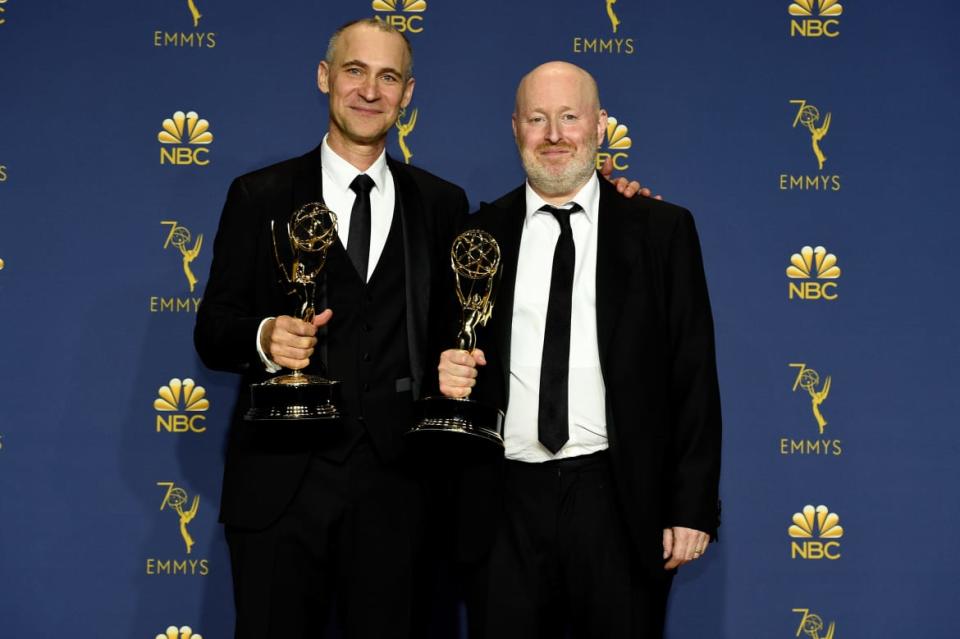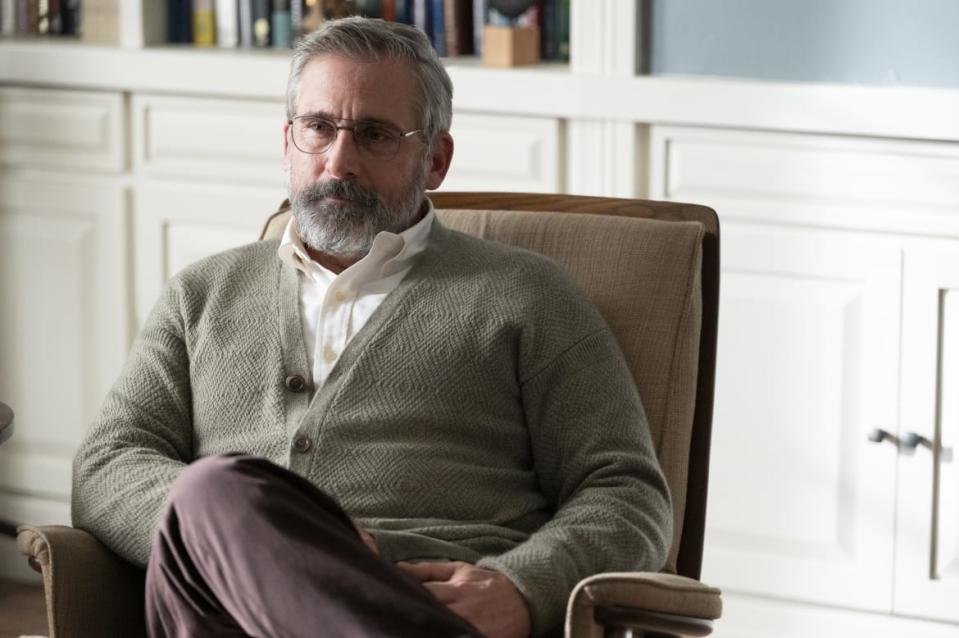Why ‘The Americans’ Creators Wanted to Probe a Serial Killer—and Holocaust Trauma

- Oops!Something went wrong.Please try again later.
- Oops!Something went wrong.Please try again later.
The Americans is one of the most critically acclaimed TV shows of the past two decades, which means that creators Joel Fields and Joe Weisberg’s follow-up was bound to be burdened by high expectations. Rather than play it safe by returning to a familiar espionage well, however, the duo take a daringly different route with The Patient, a 10-part FX on Hulu series (Aug. 30) about a Jewish psychologist named Dr. Alan Strauss (Steve Carell) who winds up traversing new therapeutic ground when one of his patients, Sam (Domhnall Gleeson), demands a more personal brand of treatment—by kidnapping him, chaining him up in the basement of his mother Candace’s (Linda Emond) house, and forcing the doctor to cure him of his worst impulses.
Sam’s fundamental problem? He’s a serial killer, albeit one who no longer wants to kill.
The Patient is a suspenseful two-hander about a sociopath with a desire to reform his bloodthirsty ways, and a therapist tasked with trying to cultivate empathy in a homicidal heart—a dynamic that’s further complicated by all manner of father-son frictions. As if that weren’t enough to chew on, Fields and Weisberg’s latest is also a tale about the tensions between liberal and conservative Judaism, which manifests itself via Alan’s lingering estrangement from his son Ezra (Andrew Leeds), whose orthodox conversion alienated him from his clan and, in particular, his dying mother Beth (Laura Niemi). Factor in Alan’s recurring Holocaust nightmares (born from his current predicament as the powerless prisoner of a murderer), and what you have is a thorny, multifaceted look at familial and Jewish trauma, all of it filtered through a nerve-wracking genre lens.
Who Is Crabfeeder, the Monstrous New ‘House of the Dragon’ Villain?
For the duo, it’s a chance to explore a variety of big questions—including about the power and limits of compassion, forgiveness, and change—while simultaneously keeping viewers on the edge of their seats. Sure to spark diverse debates, it’s a series that deliberately wrestles with contentious issues, led by Carell and Gleeson in performances that are as intense as they are surprising. We chatted with the celebrated showrunners about wading into provocative religious territory, whether empathy can be learned, and how they convinced one popular musician to let his music be the soundtrack to Sam’s killer inner life.
The Patient is a thriller, but it’s also a story rooted in Jewish trauma. Can you speak about that angle of the show, and why you wanted to marry your killer-therapist premise with an investigation into tensions between liberal and orthodox Jews?
Weisberg: This one is a really good example of how it’s not necessarily that you want to do something initially, it’s that something happens and then you let it happen and then you want to do it—or, at least, then you want to have done it. For us, we had this idea of a serial killer kidnapping a therapist, and we thought that was good, and then we started trying to flesh out the characters, and one of the things we thought of was, let’s make this guy Jewish and let’s give him a wife who’s a cantor. I’m saying this like it all happened in the same 10 minutes, which is not true [laughs]. But let’s give him a wife who’s a cantor, let’s give him a kid who’s orthodox who he’s having trouble with, and the whole thing started to just expand and have a richness and fullness and a relationship to our own personal lives too. Everything you’re saying thematically, we recognized pretty quickly was going to be very, very rich to explore, and add a level of depth to it that is part of what makes good drama.
Was it tricky to deal with these inter-Judaism tensions—and, consequently, have characters give voice to criticisms that might be upsetting, especially in our current sociopolitical climate?
Fields: I don’t think so. I think part of why we wanted to explore this was because it was something we could explore from a very personal place, and that we could try to lean into what felt most authentic to us for the characters and not worry about that part of it. It’s easy to look back on it and say, we’re dealing with themes of intolerance, and there’s the big themes of intolerance and then there are the small micro ones in this family and within the different threads of Judaism. But really, that’s all stuff—appropriately for a show that’s about therapy—that bubbled up subconsciously through our process. Then we’d talk about, be surprised by it, and navigate through the characters and their journey, and that increasingly became the story.

Joel Fields and Joe Weisberg pose with their Outstanding Writing for a Drama Series awards for The Americans during the 70th Annual Primetime Emmy Awards held at the Microsoft Theater on Sept. 17, 2018.
Were the show’s Holocaust elements there from the beginning, and did you feel that you had to tread lightly with that aspect of the story?
Weisberg: Nick, I think I can safely echo what Joel is saying, which is that the thought “tread lightly” is not something that ever occurs to us [laughs]. Really. Because when you tread heavy is when interesting shit starts to happen. Joel, that Holocaust stuff came late, didn’t it?
Fields: It did come late, but it came late because it came out of the story and character process for us, and what felt true to what we think would be triggered in this character’s mind. We didn’t set out to say, oh, we’re going to do these scenes. Instead, it just blossomed out of what was happening to him, and what we thought he would start to consider.
Weisberg: Also, since you’re on this line, I will tell you that for both of us, one of the weirdest days of our lives was on set shooting the gas chamber and concentration camp stuff, because there are all these guys in prison clothes at craft services, just walking around. It was surreal. Also being inside that set, which was realistic, was pretty moving, disturbing and odd. It was a strange day.
Did you work closely with Steve on the Jewish aspects of his character?
Fields: Steve’s a brilliant actor, and as a brilliant actor, he’s also an incredibly hard worker. So yes, we talked to him about stuff, and we know that he did a lot of his own process, and a lot of his own rehearsal with all of that. It was a lot of fun to experience that with him and to see him bring that to life.
Following The Americans, why did you opt to move into more overt psychological horror-thriller terrain? Was that always a genre you wanted to explore, or was it just how the material developed?
Fields: Really the latter. We did not sit down and say, let’s do a half-hour drama thriller, what would be a good one? We instead just spent a long time talking about what themes interested us, what characters interested us, what ideas interested us. This was one that came to the forefront.
Half-hour dramas are far from common these days. Why make The Patient a concise, limited series?
Weisberg: It was really some of the unique things about this story, because as Joel was telling you, we came up with the idea and, first of all, it just didn’t have the legs to go for more than one season—you can’t have a guy trapped in a basement forever [laughs]. The other thing was, because we realized that we were going to be spending, I don’t know what it is, 95% of the time on one set, it seemed like it wouldn’t work well if it went on for too long. It seemed like after a while, you’d get visually—and, also, in other ways—tired after a certain amount of time. So it just naturally turned into that.
Are there benefits to that more compact format?
Fields: Even as I start to list the benefits in my head, Nick, I find myself saying that those benefits are only there because of this show. This show is what it had to be. I think in a way, part of the joy of working at a place like FX is that they’re so creatively supportive that they allow us to make the shows we want to make, in the way we feel they want to be made. This one wanted to be in the half-hour drama form. There was never a discussion of, well that’s a new thing, we don’t do that. There was only, wow, this is cool and that seems right.
Given its relative brevity, did you ever consider making The Patient as a feature film?
Weisberg: It’s funny you ask that. I don’t think we ever talked about it as anything but a TV show, initially. But we did have the idea, after it was done—could we turn this into a play? We didn’t think of a movie, we thought it might be an interesting play.
How much did you research both modern psychology and serial killers?
Fields: We did research into both. Serial killers, we read some books and watched some documentaries. One of the main things we wanted to focus on and make sure of is this idea that there could be a spectrum. That you could have a serial killer who really did want to get better, and it was a believable thing. Then, there was a lot of detail, obviously, on top of that. With the general psychology, that was very important to us. We did research in two ways. One, each of us having a lot of therapy over the course of our lives [laughs]. And two, we worked with an amazing creative consultant, who became our consulting producer: Dennis Palumbo. Dennis is an incredibly talented writer in his own right, publishes novels, he’s also written some great books about writing from a psychological perspective, and he has an active therapy practice. His insight was invaluable.
The crux of The Patient is whether a serial killer can be taught to develop empathy. What did you find in your research with regards to that question?
Weisberg: We are fascinated by this question, still, and I don’t think we have precise answers to it. What we liked was the idea that there could be a serial killer who wanted to get better, and we were curious about whether or not that was possible. What we found out in our research is that it is possible and there have been serial killers like that. And also, that it’s not only a spectrum, but—as Sam himself essentially says—the stereotypical picture of the robotic psycho is a little misleading. It’s not that that might not exist, but there’s a lot of variety. I mean, these are human beings, right? There’s tremendous variety among them and how they feel and what they do.
It’s funny, you often hear with serial killers that the neighbor is so surprised. But we delved a little deeper into that and learned that these people can sometimes be quite successful in their work lives and even getting along with people. So it’s pretty interesting to think of it. Because once you say that these are humans and not just sociopaths, then we as writers are able to start digging in to create a human.
There are countless serial killer films and TV shows. Were there certain cliches or pitfalls you wanted—or sought—to avoid?
Fields: It’ll be for the audience to decide whether we were able to avoid those. But I don’t think we’ve ever succeeded by setting out to avoid something. That’s just a good way to steer right into it. But I think it was our hope that this situation of these two guys trying to do therapy together and trying to work something out overtly—where they were trying to talk about things—was in and of itself something that we hadn’t seen before, and that would allow us to explore things in a different way. And as Joe said, in a more human way.

Steve Carell as Alan Strauss in The Patient.
Where did the idea come from to give Alan his own therapist, in David Alan Grier’s Charlie—who, of course, exists only in his head? Was this because, as the show suggests, all therapy is ultimately a dialogue with oneself?
Weisberg: It’s a great question, because although I think it came somewhat late in the writing process, it was a very important move. It came out of a couple of things. One is exactly what you’re saying—this idea that this guy, what is he going to do at the most difficult time? He’s going to use the skills that’s he’s had his whole life, not only with his patients but with himself. And how could we dramatize that?
That’s where it dovetailed with the problem we were used to from The Americans. On The Americans, you have these characters who have different levels of self-awareness but almost no outlet in which they can fully, honestly, and openly express themselves to another human being. Now, that can create a lot of drama and mostly is to your advantage. But once in a while you’re like, oh, I wish he could just say this to somebody! There’s nobody to say it to! Well, essentially here, we had the most self-aware character we’d ever done, and nobody to say it to. So we came up with that idea, and suddenly he could say everything.
Lastly, was it difficult to convince Kenny Chesney to lend his music to the show, given that he turns out to be the favorite artist of Gleeson’s serial killer?
Weisberg: We were talking earlier about how, with the Alan character, we were thinking about how to add depth and build out and add specificity. We really went through the same process with Sam. What would make this guy an individual, and what would make him different? We came up with this idea of him being both a country music fan and a foodie, and then the country music idea became something that could only really work with Kenny Chesney, because Sam could be a part of this community that Kenny Chesney really has. For Sam, it would be—as Alan says—an alternate social world for him. That also fit into place. Whether it was Kenny Chesney or his people or whoever makes those decisions, we haven’t heard exactly what their thinking was, but I assumed that they got that it was coming from fans.
Get the Daily Beast's biggest scoops and scandals delivered right to your inbox. Sign up now.
Stay informed and gain unlimited access to the Daily Beast's unmatched reporting. Subscribe now.

